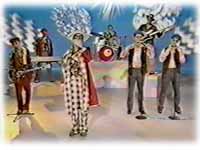THE BERT FERSHNERS (cont'd)

Josh: We've been approached by a lot of people, especially at [the US Comedy Arts Festival in] Aspen who said, "Hey, great, send us all your head shots," and it's easier to say right then, "We don't do that. We're sticking together as a group." And then the cynical industry people say, "You know, it's going to be really hard to do that. It's going to be really hard to stay together as a group. People are going to want each one of you, and how are you going to turn down $10,000 for a guest shot on a sitcom?" And you say, "Well, maybe $10,000 doesn't matter that much now that I have to compromise everything. Maybe I'll wait five years to compromise."
Mike: If one of the Fershners left for like six months, the rest of the Fershners would continue and move on, and if six or eight months later, the rest of the Fershners had developed something and were parlaying it into a television special or a series of specials or something, the other Fershner would very likely be begging to get back in at that point, and it would be really uncomfortable for everybody. For them and for the rest of the group to try to figure out what to do. "You went off on your own, and now you're back? What's up?" That kind of thing.
Mark: I think we all realize, from performing together for so long, that we create better together than we do apart.
Mike: All of us have friends who are actors out there on their own, trying to "make it," and they get little bites. You know, they get a really small role somewhere, and they're flying high for a couple of weeks, and then suddenly they're like, "What's my next thing going to be?" We, as a group, meet almost every day and write together and create together and argue and nitpick over things and--
Josh: Kiss.
AL: [laughs] Josh likes to kiss everybody at the beginning of meetings.
Mark: He has his favorites, though.
Josh: Yes, I do.
Mike: If you're out there as a solo performer, you have yourself as your support system and quite possibly you have an agent or a manager as a support person. But when you're a group, you have everybody in the group supporting you. Right now, we're all supporting the fact that we have this theatrical endeavor happening, and some other things are on hold, and we're supporting each other and saying, "It's totally okay that we're not opening on Broadway this week. It's totally okay that we don't have a television series right now. We're moving forward toward our goal."


